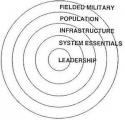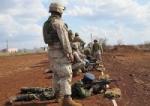...In the fall of 2006, Iraqis faced continued high levels of violence, carried out by a tangled set of warring factions. As the nature of the violence became more complex, the prospects for national reconciliation grew more distant.
Changes in the dynamics of the fighting, and the character of the insurgency and civil conflict, largely centered on the following set of emerging trends:
• Sectarian fighting, led by the growth of some 23 militias around Baghdad, formed the foundation of the civil war. Moqtada al-Sadr’s Mahdi Army developed rogue components that acted outside of his command. Sunnis formed loosely organized neighborhood death squads in the urban areas, some with ties to al-Qai’da or ex-Ba’athist groups. Two large scale attacks formed the foundation of reprisal killings in the fall: On 14 November Shi’ite militias were accused of abduction 150 people from the Ministry of Higher Education and on 23 November Sunni militants were accused of killing over 200 in bombings in Sadr City.
• Baghdad and other major cities – such as Basra and Baquba - were almost completely divided into sectarian strongholds as both Sunnis and Shi’a fled neighborhoods in which they were a minority. Soft ethnic cleansing forced upwards of 400,000 Iraqis to relocate within Iraq since the February Samarra mosque bombing.
• The Sunni Arab insurgency remained focused in the western Anbar Province and benefited from the relocation of US troops to quell sectarian violence in Baghdad.
• Attack patterns continued to focus on civilians with the average deaths per day rising to almost 100 in October. According to Iraq Coalition Casualty count, 3,539 Iraqi civilians died in September, 1,315 died in October, and 1,740 died in November. The US also saw an increase in attacks in the capital and IED attacks reached an all time high. 104 US troops died in October, the highest since January 2005. One-third of the deaths were in the capital, but the majority of US troops were killed in Anbar Province. An additional 68 US troops died in November.
• The Shi’ite community was internally divided, increasingly along militia-support lines. The Supreme Council for Islamic Revolution in Iraq (SCIRI) was the most powerful political bloc, but al-Sadr’s militia and its rogue components found widespread support from the Shi’ite population. An incident in Amara in October underscored the tensions between SCIRI and al-Sadr.
• US military attention focused on curbing the heightened concentration of violence in Baghdad, while violence outside of the capital continued to intensify, particularly in key areas such as Baquba, Basra, Mosul, and Falluja.
• Turkey pledged their support for the minority Turkoman population in Iraq and urged Iraq to take action against PKK rebel activity in the Kurdish north. Kurds continued to conflict with Arabs in key cities such as Kirkuk and Mosul.
• Regional players, particularly Saudi Arabia, Syria, Iran, and Turkey were increasingly concerned about the spread of civil war across the region....













Bookmarks